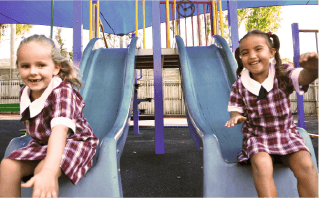
Most kids look forward to school camp all year, but for some, the idea of being away from home for an extended period of time is cause for anxiety. If your child experiences school camp anxiety, here are 10 tips to help make the experience a positive one.
School camps can be a time of fun and friendship-building. Getting away from the classroom for a few days and trying your hand at new activities can be enjoyable. But not for everyone. For many children (and parents), the fun of camp is overshadowed by concerns.
Common concerns about school camp
- Sleeping away from home in an unfamiliar place
- Responsibility for self-care, in the absence of parents
- Who they will share a room with at camp
- If they will like the food at camp
- Feeling homesick or lonely
These are all very natural concerns for a child, whether it is their first or tenth time at camp. Camps can be an excellent experience for children. Besides all the fun activities at camp, there are many opportunities for growth and development of skills.
Skills developed in school camp
- Social and teamwork skills, as children connect across the entire year level
- Skills of independence, as children take more responsibility for their self-care
- Practical life skills, as they engage in a range of activities
- Building resilience and self-confidence as they overcome challenges
10 Practical steps you can take to prepare your child for camp
Manage your own anxiety
Take a moment to notice how you feel about camp. Write down all your concerns. Some of your worries may also be your child’s, such as, “What if he can’t sleep alone?”, “What if someone is mean to him?”, “What if he hurts himself?”
Now that you know your concerns, you can prepare your child and problem solve.
Talk about what might worry your child. Talk about camp and all the things that might worry them even if they don’t seem worried. Sometimes a confident child is not concerned because they have no idea how camp works.
Parents often avoid talking about worries to confident children because they don’t want to make their children feel like they need to worry about something they are not. However, anxiety can surprise us and come in unexpected situations. The last thing you want is for your confident child to realise he fears sleeping out of the home once he is already there without the skills to self-regulate.
Talk to your child about different aspects of camp and ask how he feels about it. Here is a conversation starter:
Parent: Tom, camp is in a few weeks. How do you feel about it?
Son: I’m excited.
Parent: Do you know how camp works?
Son: Not really.
Parent: I’ll tell you about my first camp and the things I did. (Tell your child a story about your camp experience and the things you were worried about as a child and ask how they would feel about it). When I went to my first camp, I was worried about sleeping without my parents. It took me a little longer to sleep, but I had my favourite blanket, toy, family photo with me. Do you think you will find sleeping in a different room difficult?
Son: I didn’t think about it. Maybe.
Parent: What do you think you could do if this happens? Do you think taking Teddy (or any other strategy that helps your child self-regulate) with you will help?
Keep talking about different aspects of camp until you uncover what might become a problem. Knowledge is power in this situation. You can’t prepare your child for something you don’t know.
Practice sleepovers
Your child is more likely to feel positive about sleeping away from home if they have had success doing so in the past. Therefore, arrange sleepovers at a friend or relatives’ home in the lead up to camp time and continue doing so until your child is confident in their ability to sleep well when away from home and Mum and Dad.
Gather information
Find out as much as you can about the camp. Ask your teacher for the camp schedule, look at camp brochures or websites. Ask an older child over to your house to talk about the fun of camp. If possible, arrange a visit to the campsite before camp time. Familiarity builds confidence.
Find a friend
Buddy your child up with a close friend, or ask your child’s teacher for help with this. Although a confident friend may suit your child, sometimes it is a child with similar concerns who may be best matched to your child. Friends are big fear beaters!
Make packing fun
Let your child be responsible for planning, gathering and checking off items that are needed for camp. If there are things that need to be purchased, turn it into a fun shopping trip. Having your child pack their bag also ensures they know what is in it and where to find things.
Pack something special
It may be of comfort to your child to take along a special little something: a soft toy, a photo of family or a little note written by you. Whatever may help ease the separation is perfectly fine. If needed, mention this to your child’s teacher so they are aware of what is being taken along.
Practice independence skills at home
Build your child’s confidence in their ability to care for themselves by practising self-care skills. For example, can they dress and undress in the clothes they will be taking to camp? Can they shower (most camps do not have baths) safely, turning the hot water on last and off first? Can they brush and wash their hair – particularly relevant for girls with long hair!
Talk to the teacher
If there is anything of particular concern for your child or you, talk to their teacher. It may even pay to write a little note about specific concerns or things your child would like their teacher to remember while they are at camp. Remember, teachers are very likely to have taken many children to camp in the past and are best placed to help alleviate concerns.
Be positive
Talk about camp in a positive way. Tell your child that you think they are ready for camp – point out practical things they can do for themselves. Keep talking about the fun experiences of camp and let them know how much you are looking forward to hearing about camp when they return.
You can use the Superpower Kids School Camp Prep printable to help your child enjoy camp without worries.
Related Articles
AMA: Kids Anxiety. What to do?




